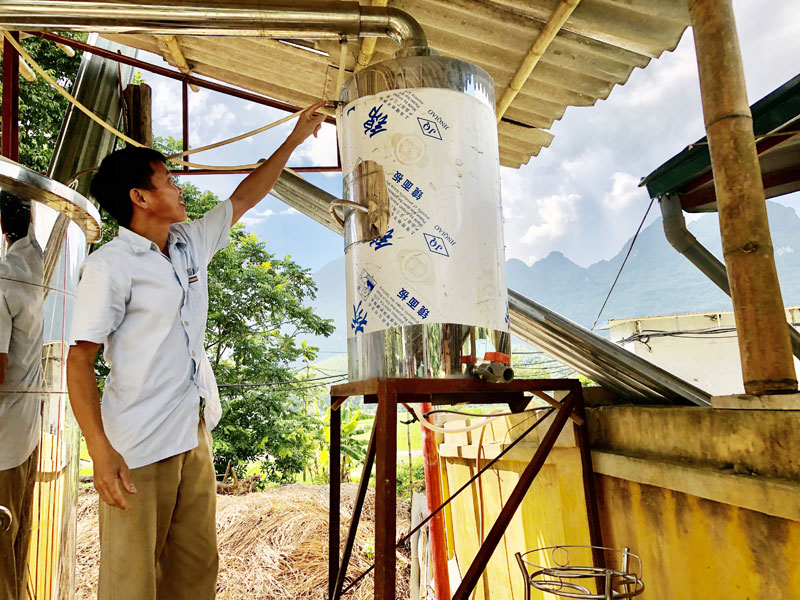
(HBO) – The Huy Chi service cooperative in Chi Bai village, Hung Son commune, Kim Boi district, has applied science and technology to produce lemongrass essential oil with the distillation method.
Huy Chi cooperative’s lemongrass essential oil in Chi Bai village, Hung Son commune, Kim Boi district, is made with modern distillers, ensuring hygiene.
The product has various uses, including repelling mosquito
and insects, deodorising, and reducing stress. In 2020, the cooperative’s product registered
for the One Commune-One Product (OCOP) Programme at the provincial level.
The lemongrass plants have been cultivated in Ba Bi village,
Hung Son commune since 2003. The weather and land in the locality is suitable for
the growth of the plant. Recognising the shortage in supply, while the economic
value of the plant is five times higher than that of rice cultivation on the
same area, the Party Committee and administration of Hung Son commune have
defined lemongrass as one of the major farm produce of the locality. So far,
the commune has had more than 48 hectares of lemongrass, mostly in Ba Bi
village.
A 1,500-litre cooker can process 500 kilos of raw lemongrass
to extract 1.5 litre of oil. Extracted lemongrass leaves are used as cow’s feed
or fertilisers. The price of a 10ml lemongrass oil bottle is 50,000 VND
(2.15 USD). The product has been ready to take part in the OCOP Programme in
2020. It has received barcodes, labels and certificate of food safety.
Nguyen Khac Thanh, Chairman of the People’s Committee of
Hung Son commune, said that the commune’s Party Committee and Huy Chi
cooperative have worked hard to complete the product for the OCOP Programme in
2020. Once recognised as a OCOP product at the provincial level, Hung Son
lemongrass growers will get a chance to improve their income and living
conditions, thus encouraging them to give more capital and technical investment
to lemongrass farms and expand the farm areas.
Being marked with OCOP stars will also help the product to
enhance its value and affirm its trademark
as well as
position, he added./.
Dao Village’s honey – a product certified with a 3-star OCOP (One Commune One Product) rating by Thong Nhat Agricultural Cooperative in Dao Village (Hoa Binh City) – is highly regarded by consumers for its quality, richness, and variety in packaging. The distinctively sweet taste of Dao Village’s honey leaves a lasting impression on anyone who has tried it.
In alignment with Project No. 07-DA/TU, issued by the Hoa Binh provincial Party Committee on November 1, 2021, Lac Thuy district has actively promoted investment and supported the sustainable development of its industrial and handicraft sectors during the 2021–2025 period. Alongside this, the district has remained committed to preserving and revitalising traditional craft villages.
Located in the northern part of Lac Thuy district, with a temperate climate and fertile soil, Phu Thanh commune has great potential and advantages in growing tea. The long-standing experience, combined with strict adherence to organic farming practices in the tea gardens, ensures that the dried tea products from Phu Thanh and Lac Thuy as a whole are sold out immediately upon production, providing a stable and prosperous life for the local people.
Amid efforts to streamline the administrative apparatus, Hoa Binh province has intensified measures to address challenges in land clearance, resettlement support, and infrastructure investment, aiming to speed up the progress of key projects.
Hoa Binh province has posted an unprecedented economic growth rate of 12.76% in the first quarter of 2025, marking its highest quarterly performance to date and positioning it as the second fastest-growing locality in the country, trailing only Bac Giang province.
Under current regulations, products in the One Commune – One Product (OCOP) programme that are rated three stars or higher must undergo re-evaluation every three months. However, in reality, some of these products fail to consistently meet the required standards, raising concerns about the sustainability of their OCOP certification. This underscores the urgent need for producers to enhance product quality and gradually develop their OCOP products into strong, marketable brands.



